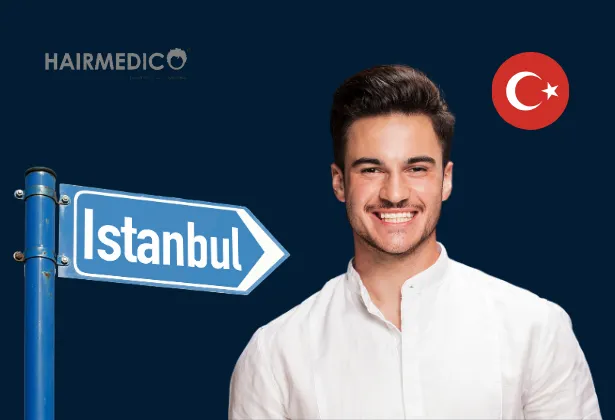
1. Why is Turkey a leader in hair transplantation?
1.1. The expertise of Turkish surgeons
1.2. Much more affordable costs
1.3. State-of-the-art medical infrastructure
2. Hair transplant techniques in Turkey
2.1. The FUE method (Follicular Unit Extraction)
2.2. The DHI method (Direct Hair Implantation)
2.3. The FUT method (Follicular Unit Transplantation)
3. University Degree in Baldness Treatment
4. Dr. Arslan Musbeh: A Unique French-Speaking Surgeon in Turkey
5. Beware of Unregulated Clinics
6. Technological Advances in Hair Transplantation
7. Testimonials from Patients and Public Figures
8. Recovery Process and Post-Operative Care
9. How to Choose the Right Clinic?
Turkey has become a top destination for people seeking hair transplant procedures. Every year, thousands of patients from around the world travel to Istanbul and other major Turkish cities to benefit from advanced hair restoration treatments. Several factors explain Turkey’s dominant position in this field:
Hair transplant surgeons in Turkey have internationally recognized expertise. Many have undergone advanced training abroad and apply the most innovative techniques available. In addition, the high number of transplants performed annually allows them to deliver natural and harmonious results.
Compared to European and North American countries, Turkey offers hair transplant procedures at significantly lower prices. This price difference is mainly due to lower living and medical costs, allowing clinics to offer affordable rates without compromising the quality of care.
Turkey boasts modern medical infrastructure equipped with the latest technology in hair transplantation. Many clinics are accredited by international health organizations, ensuring high standards of safety and hygiene.
FUE is the most widely used technique in Turkey. It involves extracting individual hair follicles and implanting them in bald or thinning areas. This method is popular for being minimally invasive and leaving no visible scarring.
DHI is an advanced version of FUE, using a special implanter pen to insert the follicles directly into the scalp. This technique offers higher density and faster recovery time.
Less common today, the FUT method involves removing a strip of scalp from the back of the head, from which follicles are harvested and then implanted. It is typically recommended for patients who require a large number of grafts.
Claude Bernard University Lyon 1 offers a university diploma in Baldness Treatment, allowing physicians to specialize in hair transplantation. This program provides in-depth training on modern techniques and post-operative care.
Dr. Arslan Musbeh is a hair transplant surgeon known for his expertise and personalized approach. He is one of the few doctors in Turkey who speaks fluent French, making communication much easier for French-speaking patients.
While Turkey offers excellent options for hair transplants, it is crucial to choose a licensed clinic. Many unregulated clinics operate without official certification, putting patients' health at risk.
New technologies, such as robotics and artificial intelligence, are revolutionizing hair transplantation. These innovations allow for greater precision and reduce the risk of human error.
Many celebrities have undergone hair transplant procedures, helping to popularize the treatment. Testimonials from satisfied patients further enhance the reputation of Turkish clinics.
Proper post-operative care is essential for ensuring healthy hair regrowth. Patients are advised to avoid physical exertion, sun exposure, and to carefully follow the surgeon's instructions.
Before selecting a clinic, it is recommended to check accreditations, read reviews from former patients, and request a consultation with the surgeon. A reputable clinic will always provide clear, detailed information about the procedure.
Choosing to undergo a hair transplant in Turkey can be a life-changing decision for individuals suffering from hair loss. Thanks to advanced techniques and the expertise of skilled surgeons, patients can achieve natural and lasting results. However, it is crucial to conduct thorough research before selecting a clinic to avoid the risks associated with unlicensed facilities.
Your consultant is ready to answer your hair transplant questions, and you can also get a personalized online hair analysis.